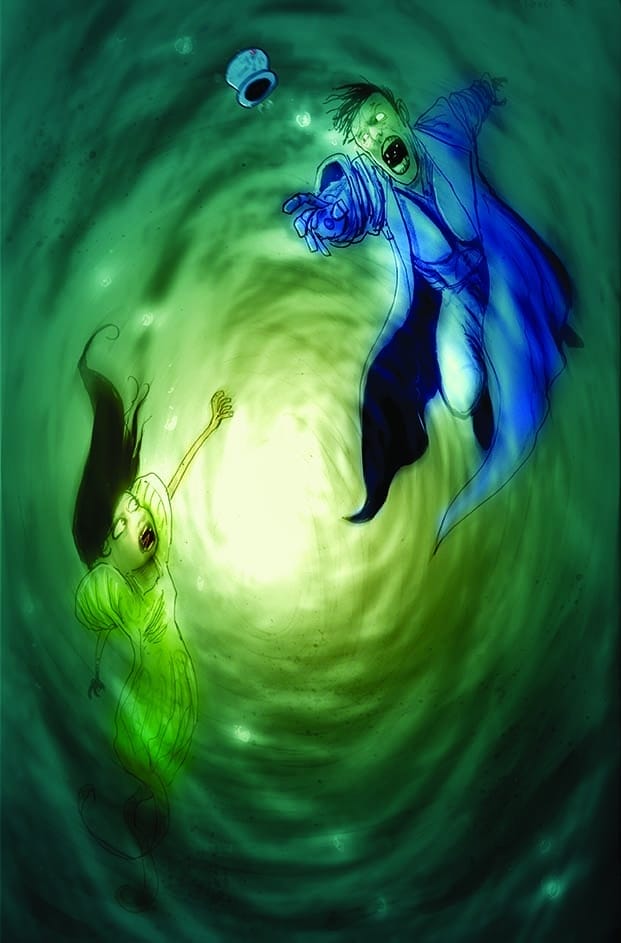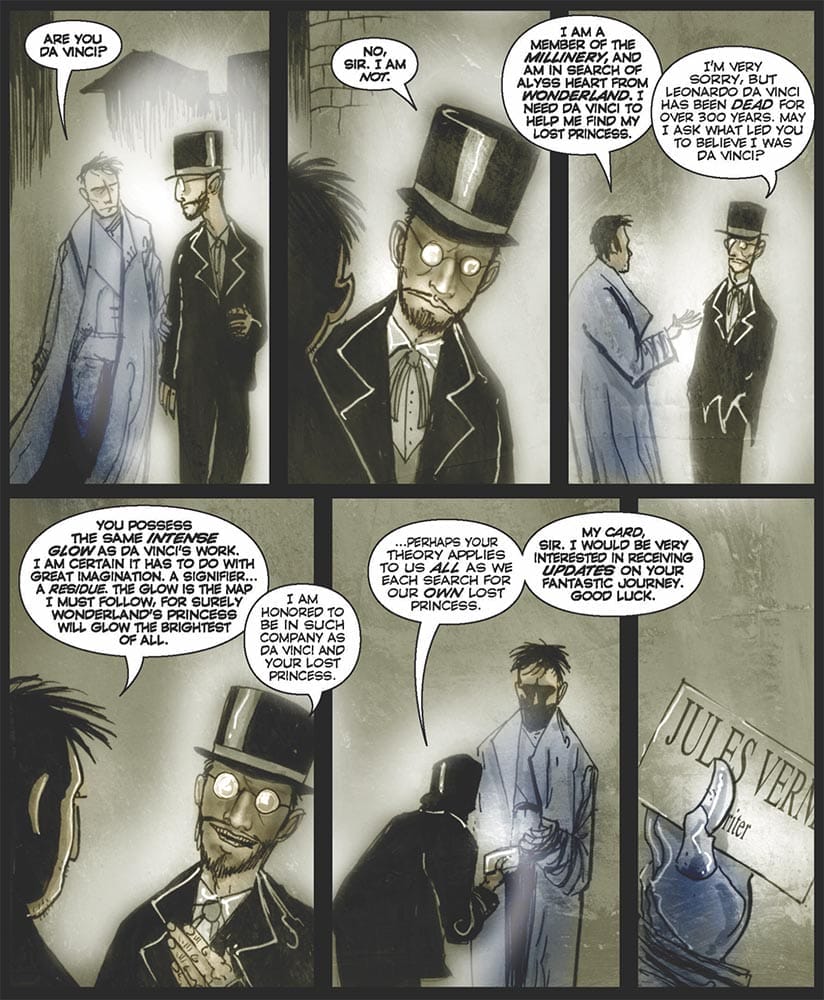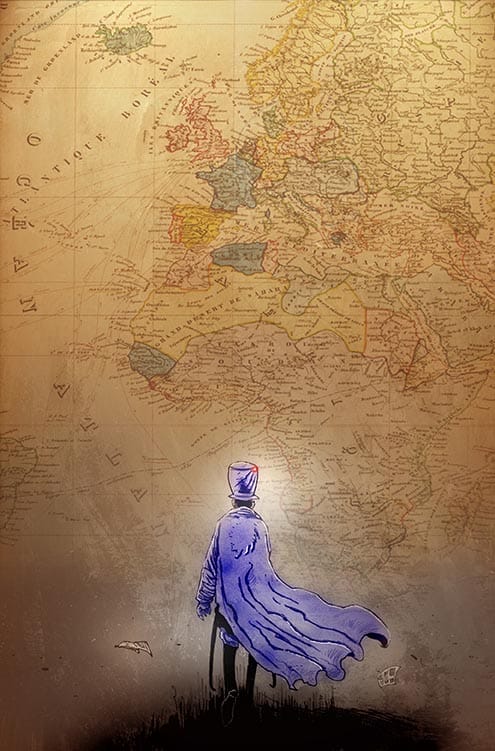This is NOT the story of the Mad Hatter.
Hatter Madigan, is an expert bladesman, a High Cut of Wonderlands Millinery, not the tea guzzling madman of children's lit. The only visual connection to the (Mad) Hatter in Lewis Carroll's books or the Disney film Alice in Wonderland is the iconic hat.
Hatter Madigan, leading member of Wonderland’s elite security force known as the Millinery, bodyguard to Queen Genevieve Heart, catapulted out of a body of water where none should have been, landing on his feet in a battle-crouch, ready to fight. He reached for the top hat that he could flatten into S-shaped rotary blades and send slicing through an enemy; it wasn’t on his head.
A current had carried it away from him in The Pool of Tears, the portal that—though he didn’t yet know where he was—had brought him here, to the Namib Desert in Southern Africa, Earth.
“Alyss?” he shouted, surrounded by creatures with thin legs and long necks who flapped their wings in annoyance; this drenched, obviously desperate individual had interrupted their wading.
“What place is this?” he demanded of the flamingos.
They flew at him. Hatter flexed his fists, and his bracelets opened into deadly propellers on the topsides of his wrists. He shrugged, and his Millinery backpack sprouted knives and corkscrews of various lengths and thicknesses. But the flamingos rose higher, flying toward the horizon, leaving him solitary in an endless landscape of sand dunes.
His top hat splashed out of the water and landed near his foot.
“ALYSS!” He had lost Princess Heart. It was the greatest failure of his life—a failure, as he was all too aware, that meant the end of Wonderland as he knew it.

Orphaned when his Milliner parents went missing on a mission, Hatter had grown up at the Millinery Academy with his older brother Dalton. He’d spent his formative years surrounded by its tenders (employees), its cadets, tutors, and Milliners. He’d been subject to the academy’s rules for almost as long as he could remember and had learned the Millinery Code as a bedtime lullaby, swearing allegiance to serve and sustain Light Imagination and its queen, to master the forging of immaculate blades, to excel in personal combat, and to contain and control all emotion.
Year after year, as Dalton proved his military gifts at the academy, Hatter longed to begin his own training, often practicing advanced moves with whatever he could find—a mop for a sword, a hatbox lid for the S-blades of a spinning top hat. More than a few times, his eagerness led him into trouble. He sneaked into training facilities that were off-limits to the younger cadets, never mind someone who wasn’t even old enough to be a cadet. And he “borrowed” weapons that weren’t his.
“You can’t just do what you want, when you want,” Dalton would scold.
It was antithetical to the discipline required of a Milliner. Hatter’s enthusiasm to begin training was commendable, but—
“You must learn to subdue your enthusiasms, your loves, and even your hates,” Dalton warned. “Emotion clouds judgment. All must be subordinate to duty—a dispassionate performance of one’s duties keeps a Milliner focused. In battle, it keeps him alive.”
As Dalton’s reputation at the academy grew, so did Hatter’s idolization of him. If his older brother wasn’t always around, well, it didn’t feel as neglectful as it might have because he knew that Dalton was busy with important matters, possibly queendom-saving matters. Besides, he could always find companionship with his best friend Weaver, a young civilian girl who, orphaned like him, was growing up at the Millinery.
The two youngsters often met up in little hideaways on the Millinery campus. Dalton graduated from the academy as Top Cadet just as Hatter officially began his training. Expectations for Dalton’s younger brother were high, and Hatter, doubting himself, often complained to Weaver that Dalton’s reputation felt impossible to live up to. But Weaver’s calm confidence buoyed him and gave him inner strength.
In his early years as a cadet, though, Hatter wasn’t the most disciplined, always eager to take on more than he was supposed to—his talents in combat training making him impatient with the slower progress of systematic tutelage. His stays in detention and the lectures he received from authorities only confirmed, in his own mind, that he would never be as good as Dalton, and who had never been chastised for breaking rules, who seemed as adept in political and social settings as he was in battle, whereas he, Hatter, wasn’t all that great on the social front.
Yet Hatter learned to control himself enough to graduate from the Millinery as Top Cadet, by which time, his and Weaver’s relationship had blossomed into more than friendship.

Hatter knew that, as a Milliner, he shouldn’t have been consorting in such a way with a civilian. Certainly, Dalton would not have broken Millinery protocol by having a secret, civilian lover. To lessen the guilt he felt for his trespass, Hatter worked extra hard at maintaining Millinery composure when on duty at Heart Palace, shadowing Queen Genevieve as her personal bodyguard, which meant being stoic, alert, ever ready to sacrifice himself for his queen.
If Hatter had learned that Weaver was pregnant with his child, the guilt he felt on account of their relationship might have proved overwhelming. But Weaver never told him. Knowing how conflicted he’d be at the news, understanding that the child would be a stain on his reputation, if not worse, she put off telling him. But then her pregnancy was becoming impossible to hide. At their next weekly rendezvous far from the center of Wonderland, she decided, she would confide that he was to be a father.
The rendezvous never happened: Hatter forced to cancel because it was Princess Alyss Heart’s birthday. Instead of basking in his girlfriend’s company, pretending that he and Weaver were just an ordinary Wonderland couple unencumbered by public duties and expectations; instead of such usual reveries being interrupted by Weaver confessing her pregnancy, he shadowed Queen Genevieve during the birthday celebrations.
In Heart Palace’s South Dining Room, Princess Alyss and her guests were enjoying wonder-crumpets and tarty tarts when the heavy double doors blew apart, a wall crumbled, and a horde of renegade card soldiers charged through the blasted opening with swords raised.
Appearing amid the crumbled stone and splinters of wood: a nightmare version of Queen Genevieve.
“Off with their heads!” the nightmare screamed. “Off with their stinking, boring heads!”
Hatter, instinctively flicking his top hat into a flattened array of blades that he flung at the attackers with a ninja’s accuracy, would have recognized the woman even without her gown of flesh-eating roses.
It was Rose Heart—a.k.a. Redd—Genevieve’s older sister, who had long ago been cast aside as heir to the throne for . . .behavioral problems.
Redd, supremely gifted in Dark Imagination, was no ordinary enemy, Hatter knew.
It’s a coup, he thought, catching the top hat blades that boomeranged back to him.
Wonderland chessmen engaged against Redd’s soldiers. Bodies fell. Courtiers scrambled for safety. Amid it all, Hatter deftly defended Queen Genevieve from violence, doing away with more of the enemy than seemed possible for a single Milliner, until—
“Take Princess Alyss and go,” the queen urged him, pointing at a looking glass. “As far away as possible.”
Go? But his life’s mission was to protect Wonderland’s queen.
“You must keep the princess safe until she’s old enough to rule,” Genevieve insisted. “She’s the only chance Wonderland has to survive. Promise me you’ll keep her safe.”
Hatter bowed his head. So long as Queen Genevieve lived, the Millinery code demanded that he should remain and fight. But wasn’t the queendom more important than any single queen? And if Wonderland’s future depended on Alyss’s survival . . . ?
He wasn’t sure about any of it, but he lifted his eyes to Genevieve’s. “I promise,” he said, and carrying the seven-year-old princess, he leaped into the looking glass.
They emerged in the Whispering Woods. Redd’s top assassin, The Cat, gave chase. Seekers—deadly creatures with vulture bodies and fly heads—screeched in the sky above, tracking them.
Nowhere in this realm will be safe, Hatter thought. As long as Redd believes that Alyss is alive, she will hunt the princess down. I have to get her to The Pool of Tears . . .
The pool: a rumored portal said to carry those who entered its waters out of Wonderland. No one who had splashed into the pool had ever returned.
The only chance she has to grow into a queen is to be as good as dead to Wonderland.
And so, with Alyss in his arms and The Cat about to pounce, Hatter leaped from a precipice overlooking the pool.
Milliner and princess shot deep into the water’s swirling depths. Currents shifted. It became increasingly difficult for Hatter to hold on to the girl. Her panicked flailing didn’t help.
Suddenly, she was out of his arms, falling away from him.
Again, currents shifted.
Hatter shot up to the surface with the same force and speed as his descent, emerging from a puddle onto the sand dunes of Namibia.
If Princess Alyss was Wonderland’s only chance to survive—a Wonderland governed by the enlightened principles of Light Imagination—then he had squandered it. He had—and he was sure of this; Redd was too powerful, too merciless—let Queen Genevieve die. He had forsaken his Millinery duty in the worst way. The Queen had meant to sacrifice herself to save her daughter and the queendom, but Hatter, in losing the daughter, had made a sacrifice of both of them. And still lost the queendom.
He felt a sham, a fraud. Losing Alyss proved everything he’d feared about himself—he wasn’t good enough to follow in Dalton’s path, hadn’t been worthy of Top Cadet honors. He’d never deserved his stellar reputation as a Milliner. From his earliest days as a cadet, he’d been unable to strictly follow the Millinery Code—his impatience with teachings, his love of Weaver. And now this, the worst violation of the code, his having left Queen Genevieve to die.
A group of natives crested a nearby sand dune. One of them glowed as if from an inner light.
The glow of imagination: Hatter recognized it from Wonderland. Princess Alyss, whose imagination was said to be prodigious, wouldn’t fail to glow in this world. Maybe those gifted with imagination in this world could lead him to his lost charge? Maybe, just maybe, he could find Princess Alyss Heart and redeem himself—not totally; he would always be supremely flawed, he now knew. But maybe he still had a chance to fulfill his promise to Queen Genevieve and save Wonderland from Redd Heart’s tyranny. He would follow the glow.
Spain, Portugal, Italy, Belgium, Switzerland, Austria, Bavaria, Hungary, Greece, Poland, etc.—following the glow of imagination, Hatter twice traversed the European continent in his search of Princess Alyss.
No luck, though he did meet a number of people who, listening to his tale of Wonderland and the missing Princess Alyss, were inspired to imaginative outpourings that brought them fame, such as Jules Verne and Bram Stoker.

But not all run-ins with imaginative Earthlings were positive.
In Budapest, Hatter rescued an orphanage’s worth of young girls who, by means of a diabolical machine, were being drained of their imaginations to make them easier to control (drain the world’s population of all imagination: rule the globe). For the good of humanity, Hatter destroyed the machine.
He saw echoes of Wonderland inventiveness everywhere. As in Wonderland, he realized, so too on Earth: Light and Dark Imagination were at war with each other.
If he was to find Alyss, he realized, he would have to follow not only the glow of Light Imagination, getting assistance from those similarly gifted to the Heart Princess; he would have to seek out enemies of Light Imagination—those who, whether they knew it or not, were practitioners of Dark Imagination, and who would either want to twist Alyss’s talents to their own purposes or kill her.
And so, driven by guilt over his failure to Queen Genevieve, to Princess Alyss, to the entire queendom, missing Weaver constantly, Hatter traveled the globe with an uncanny knack for influencing important social or historical events. He canvassed America during its civil war, and how much his meeting with Abraham Lincoln impacted military action, none can say. He traveled down through Mexico and South America, skirted the Antarctic Peninsula. He passed into Canada, made his way to the Far East.
Weaver.
He remained devoted to her in his heart—conflicted still, yet devoted. But this didn’t keep him from temptation. Realm, a Native-American, a sort of medicine woman skilled in the practices of Light Imagination on Earth, saved his life in an Arizona desert; Jet Seer, a Chrononaut or time traveler, was on a world-building quest, gathering DNA from history’s exceptional beings so that they could live again in the future: such strong, powerful women offered Hatter brief solace; he loved them in their own right, but they were also wistful reminders of the love he had lost in Weaver.
As he roamed, maps sticking out of every available pocket, worn from use and much scribbled on with notes of where he’d been and what routes he’d taken, Hatter’s legend grew. Though the languages in which it was told varied as widely as the terrain he covered, and the details of the story often changed, its basic premise was the same: a solitary man, blessed with fearsome physical abilities and armed with a curious assemblage of weaponry, crossed continents on a mysterious quest.
Fearsome abilities?
The longer Hatter went without finding Alyss, the more trouble he had controlling his hat blades, the less accurate he was with knives plucked from his backpack, and the more he berated himself for his failure.
He had no way of knowing, but his increasing clumsiness and depression paralleled Princess Alyss’s waning memories of Wonderland. Just as in quantum entanglement, where a change of spin or position in one electron affects its partner, though the partner electron be a great distance away, so it was with Hatter and Alyss: the two were connected by a kind of entanglement of imaginative power.
Hatter’s confidence and abilities hit an all-time low just as Princess Alyss, growing up in Oxford, England as Alice Liddell, a middle-class Victorian young lady, stopped dreaming of Wonderland altogether—dreams being all that remained to her of her former life in Wonderland. With Alyss brainwashed by so-called reality, Hatter was reduced to a brooding wanderer with no special gifts, martial or imaginative; a seeming lunatic obsessed with delusions of some princess and a place called Wonderland. He still tried to fight sometimes, such as when he stumbled across the glow of imagination and thought he might have found Alyss, but he was easily subdued. Eventually, for the good of everyone, he was locked in a sanatorium.
Seemingly beyond all hope, mumbling his lunatic doggerel about Wonderland more from habit than anything else, Hatter got older in his cell. But then Alice Liddell again began to dream of Wonderland, and just as the truth of her history and her imaginative powers started to dawn anew in her, so Hatter, on account of their entangled imaginative power, began to regain his former self—determined, martially formidable.
A hand reached out of the small looking glass in his cell.
“Alyss!” Hatter breathed, unaware that whatever else the future was going to bring, this—Alyss Heart being alive, his chance to save Wonderland not yet gone—was only the half of it.
